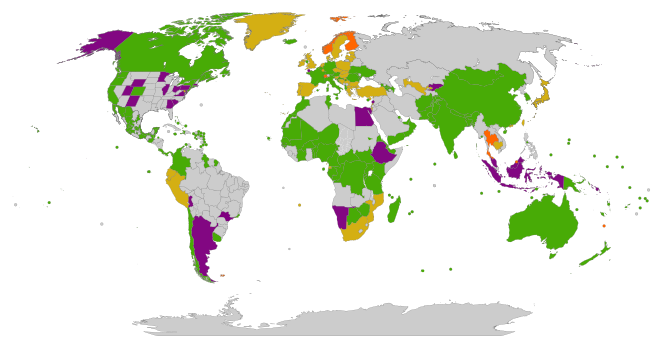Plastic bans
Plastic bags bans are laws that prohibit the use of polymers manufactured from petroleum or other fossil fuels, given the pollution and threat to biodiversity that they cause. A growing number of countries have instituted plastic bag bans, and a ban on single-use plastic (such as throw-away forks or plates), and are looking to spread bans to all plastic packaging, plastic clothing (such as polyester and acrylic fiber, or any other form of unnecessary plastic that could be replaced with an easily biodegradeable, non-fossil-fuel or non-polluting alternative. Plastics biodegrade over a long period of time, and may not biodegrade fully (so that they are absorbed into the ecosystemic) leaving traces of microplastics, ranging from 450 years for a PET plastic bottle (type 1) to thousands "never" for polypropylene-based products, including food containers (type 5).[1]
Plastic bag bans

Single-use plastic bans
The European Union Plastic Products Directive 2019 banned single-use plastic plates, cutlery, straws, balloon sticks and cotton buds; cups, food and beverage containers made of expanded polystyrene, and all products made of oxo-degradable plastic, and to fishing gear containing plastic.[2] The fuller list of plastics banned are listed in the Annex to the Directive.[3]
From October 2023, the UK government has banned "single-use plastics" in England, which are defined to include a range of products, but does not include "shelf-ready pre-packaged food items" found in most supermarkets.[4]
China has a phased-in program of plastic bans from 2020 to 2025 on products from bags, to straws, to cutlery, to certain packaging, to items in hotels.[5]
As of May 2024, 12 states in the United States (California, Colorado, Connecticut, Delaware, Hawaii, Maine, New Jersey, New York, Oregon, Rhode Island, Vermont and Washington) have banned single-use plastic bags.[6]
In Nigeria, reports shows that over 60 million plastic sachets are used and disposed daily,[1] and only about 12% is recycled. The potential hazards from these reports has prompted the ban of single use plastics in Nigeria from 2025.[3]
Plastic packaging and clothing bans
There have been broader calls for bans on use of plastics in all packaging, particularly in supermarkets and products, and in clothing.[7]
See also
- Bioplastic
- Cutlery
- Phase-out of fossil fuels
- Phase-out of fossil fuel vehicles
- Phase-out of gas boilers
- Montreal Protocol
Notes
- ^ a b Types of Plastic - A Complete Plastic Numbers Guide (2020) YesStraws.com
- ^ 'EU unveils plans to cut Europe’s plastic and packaging waste' (30 November 2022) Guardian
- ^ a b Plastic Products Directive (EU) 2019/904, Annex
- ^ 'Far-reaching ban on single-use plastics in England' (14 January 2023) gov.uk. J Clinton, 'October start set for ban in England of single-use plastic tableware' (14 January 2023) Guardian
- ^ See Waste 360 and BBIA.org.uk
- ^ Meiffren-Swango, Celeste (January 17, 2024). "Plastic bag bans work". Environment America. Retrieved May 24, 2024.
- ^ e.g. S Usborne, 'The big fashion fight: can we remove all the toxic, invisible plastic from our clothes?' (16 July 2019) Guardian
